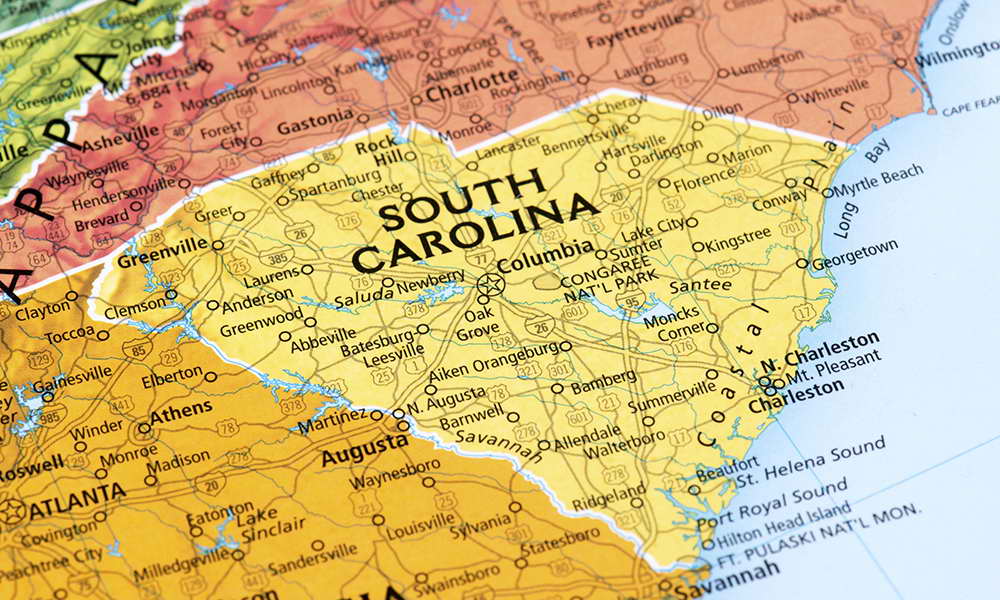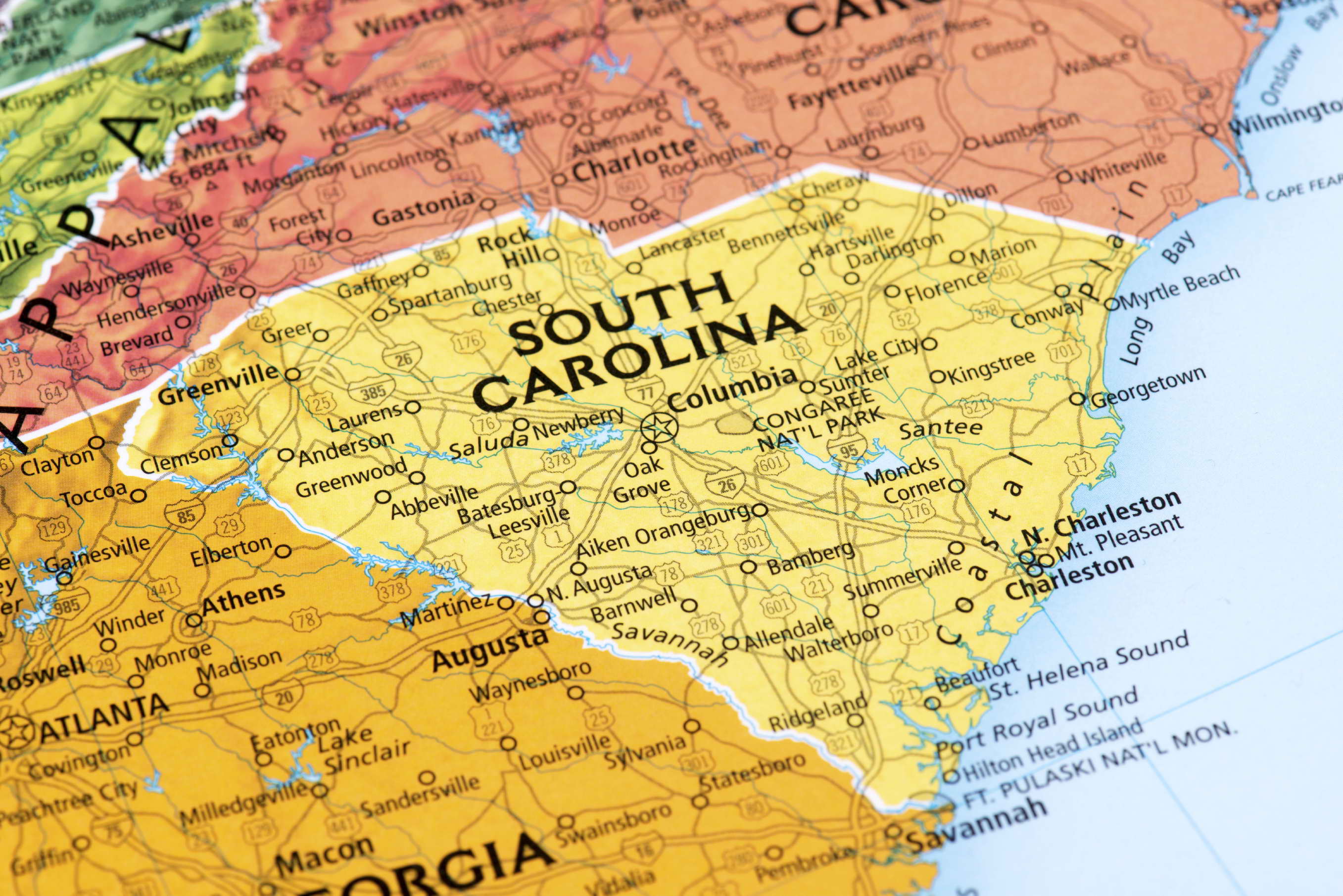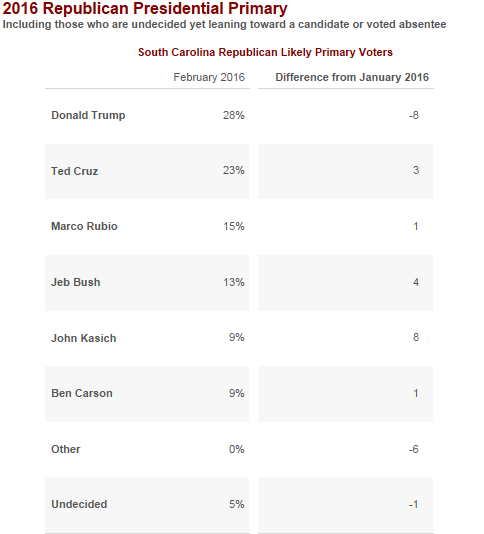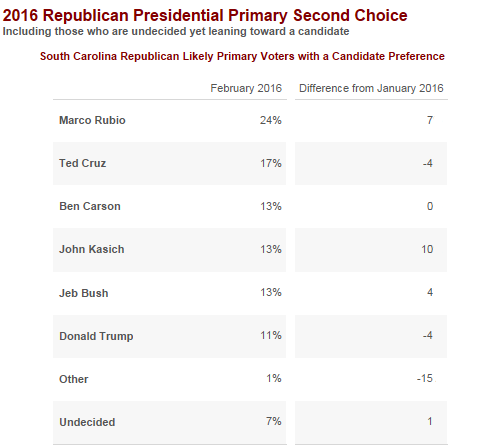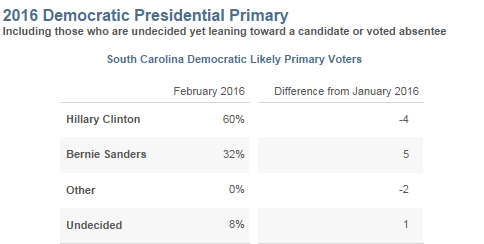February 19, 2016
2/19: Trump in Close Race in South Carolina… Clinton with Wide Lead
In the latest NBC News/Wall Street Journal/Marist Poll of South Carolina conducted after Saturday’s GOP debate, businessman Donald Trump, 28%, edges Texas Senator Ted Cruz, 23%, by only 5 points among likely Republican primary voters statewide including those who are undecided yet leaning toward a candidate or who voted by absentee ballot. Last month, Trump had a 16 point lead over his closest competitor Cruz, 36% to 20%.
Florida Senator Marco Rubio places third with 15%. Rubio is also the most mentioned second choice with 24% among likely Republican primary voters with a candidate preference. Of note, this survey was conducted prior to South Carolina Governor Nikki Haley’s endorsement of Rubio.
Former Florida Governor Jeb Bush follows closely behind Rubio with 13% having improved his standing among moderates. Ohio Governor John Kasich, who enjoys a bump following his second place finish in New Hampshire, receives 9% up from 1% in January. Retired neurosurgeon Ben Carson also garners 9%, little changed from 8% last month.
The contest has become more competitive primarily due to the decline in Trump’s support rather than major gains by Cruz or Rubio. Trump’s lead over Cruz has declined across the board but especially among likely Republican primary voters who earn less than $50,000 annually, are very conservative, do not practice a religion, men, those under 45 years old, are not married, or are Tea Party supporters. Trump, who was closely matched with Cruz among very conservative GOP voters in the state last time, now trails Cruz by 20 points, 22% to 42%. Trump also led by double digits among Tea Party supporters statewide, but he currently places behind Cruz, 31% to 35%. Trump is competitive with Cruz, 29% to 26%, among white evangelical Christians who make up about six in ten likely Republican primary voters in South Carolina. But, last month, Trump was ahead of Cruz among these voters by 8 points.
“Will South Carolina return to its traditional place in picking the Republican nominee?” asks Dr. Lee M. Miringoff, Director of the Marist College Institute for Public Opinion. “With the race tightening, it looks like South Carolina may not be any better than Iowa and New Hampshire in clarifying the race.”
60% of likely Republican primary voters with a candidate preference including absentee voters in South Carolina say they strongly support their candidate selection. Five percent are undecided, and 13% report they might vote differently. 71% of Trump’s supporters compared with 66% of Cruz’s backers, 52% of those behind Rubio, and 46% of Bush’s supporters say they are firmly committed to their choice of candidate.
As mentioned, Rubio, 24%, is the preferred second choice candidate of likely GOP voters with a candidate preference. Cruz, 17%, Carson, 13%, Kasich, 13%, Bush, 13%, and Trump, 11%, follow.
On the Democratic side, former Secretary of State Hillary Clinton, 60%, outpaces Vermont Senator Bernie Sanders, 32%, by 28 points among likely Democratic primary voters in South Carolina including those who are undecided yet leaning toward a candidate or who voted by absentee ballot. Her lead is down from 37 points last month.
Clinton’s support is especially bolstered by likely Democratic primary voters who are African American and 45 or older. She outdistances Sanders by 66 points among these likely Democratic primary voters. It is noteworthy that Clinton’s lead diminishes to 17 points over Sanders among African Americans under 45 years of age. Clinton also outperforms Sanders by 39 points among Democrats whereas Sanders has a 14 point lead among independents. Although Clinton is ahead among men and women, she outperforms Sanders by a much wider margin among women. Sanders has an advantage among first-time voters, those under 45 years old, or those who are white.
“Clinton is positioned to carry South Carolina by racking up huge numbers among African Americans who are expected to make up about 60 percent of the Democratic primary electorate,” says Dr. Lee M. Miringoff, Director of The Marist College Institute for Public Opinion. “Right now, the Clinton firewall is holding firm in this state.”
69% of likely Democratic primary voters with a candidate preference including absentee voters strongly support their candidate of choice. Eight percent are undecided, and 9% might vote differently. 72% of Clinton’s supporters and 62% of Sanders’ backers say they will not waver in their commitment to their candidate.
President Barack Obama’s approval rating is still upside down in South Carolina. 42% of South Carolinians approve of his job performance, identical to the 42% he received last month. He has strong support among likely Democratic primary voters with 89%.

